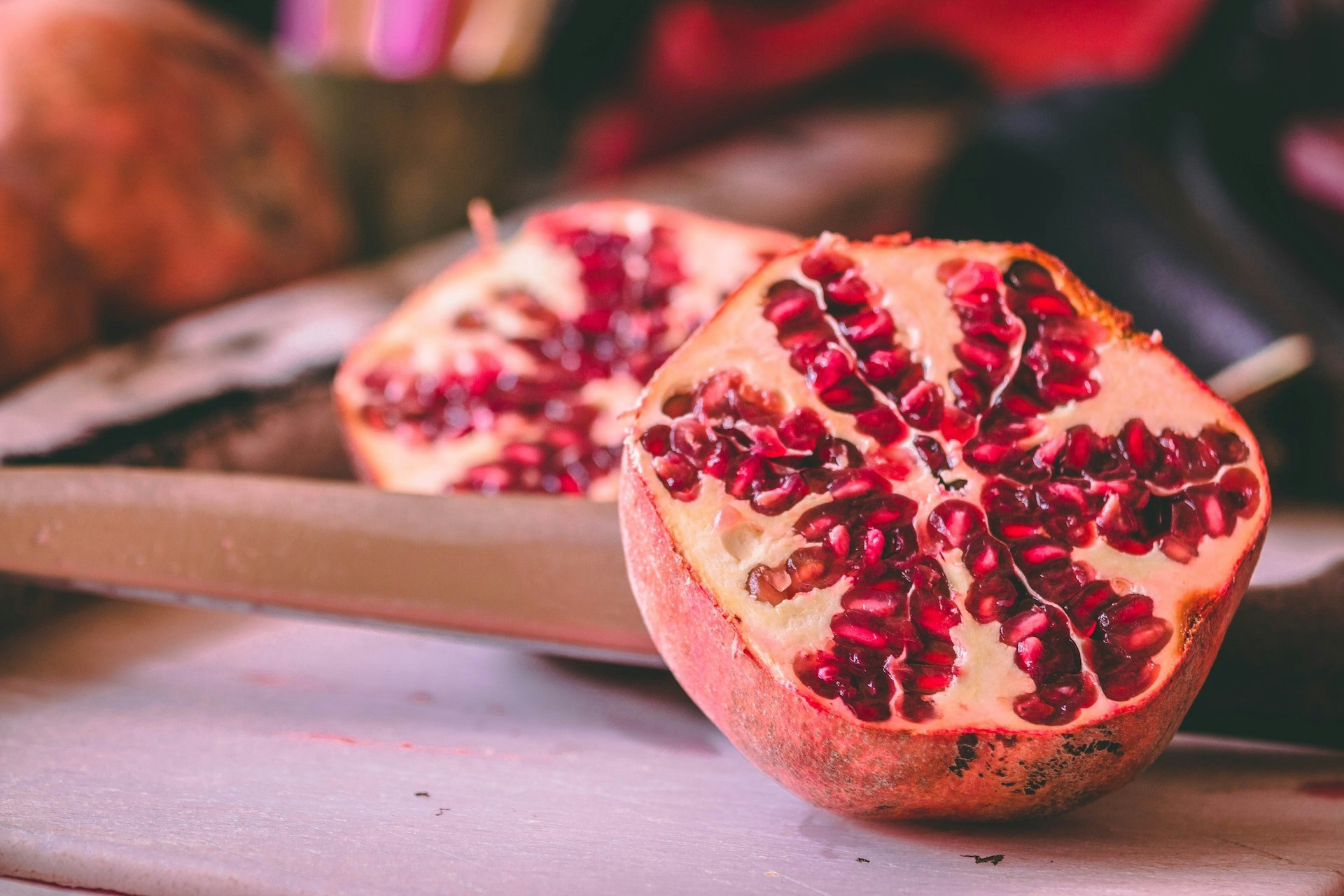The word “pomegranate” has its roots in medieval Latin and refers to an apple that contains numerous seeds. While it was believed to have originated in Persia, it has now spread to many other countries across the globe. The fruit is highly sought after, and the plant is also cherished for its aesthetic appeal, often being used as a decorative plant in gardens and landscapes.
Pomegranate juice has been known for its benefits since ancient times. It was used in Iran to soften meat by marinating it in the juice, and it was also known for its medicinal properties. Pomegranate juice is naturally sweet and contains a variety of antioxidants, fiber, vitamins, minerals, and flavonoids.
The Anatomy of a Pomegranate
Pomegranates have a distinctive appearance, as they are round and have a thick red skin. Their inner walls are spongy and white, and they contain the arils – white seeds that are covered in thick, ruby red juice sacs. The juice sacs have a delicious sweet and sour flavor, while the seeds are crunchy and edible.
Does Pomegranate Juice Include the Seeds?
There are various ways to enjoy pomegranate, but the most common way is by eating it handheld. To eat it this way, you simply cut open the fruit and pull it apart to reveal the seeds and juice sacs. Alternatively, you can remove the seeds and press them to extract the juice. If you ever visit Turkey, you'll be impressed by how quickly they juice pomegranates using a pomegranate press right on the streets. Not only is it delicious, but it also provides numerous health benefits.
Pomegranate juice can contain seeds, depending on how it is processed. The seeds, known as arils, are surrounded by juicy pulp. Some methods of juicing remove the seeds and pulp, resulting in seedless juice. However, many commercially available pomegranate juices include the arils and pulp, which provide a more authentic and nutritious experience. These juices may have a slightly pulpy texture and small, soft seeds. If you prefer a smoother juice without seeds, specifically labeled “seedless” options are available.
Like many other fruits and vegetables, clear pomegranate juice doesn't contain the same amount of fiber as pomegranate arils. When making juice, crucial nutrients such as fiber and vitamin C are lost. However, if you enjoy drinking seedless pomegranate juice, you can still reap the benefits of its antioxidants, essential nutrients like potassium, and other health advantages.
The Benefits of Drinking Pomegranate Juice
Undoubtedly, these fruits are stunning, but their beauty isn't merely superficial. In this article, we will discuss how these succulent and delightful fruits can enhance your diet and why their seeds are as beneficial as their juice. Let’s get right to it.
Pomegranates provide a nutrient boost. They are a great way to get your daily dose of vitamin C, vitamin K, and potassium, along with other essential nutrients. Consuming a single pomegranate provides you with approximately 28mg of vitamin C, which is almost half of what you need each day. However, the vitamin C content is reduced when juiced.
A pomegranate also contains around 666 mg of potassium, which is 19% of your daily recommended intake. After the juicing process, about 536 mg or 15% of your DRI is retained. Potassium is vital for maintaining strong nerves and a healthy heart. By consuming fresh pomegranates or their juice, you can easily get the necessary amount of this crucial mineral.
1. Antioxidant Powers
Pomegranate arils contain polyphenol antioxidants, which are known for their ability to fight unstable molecules that can damage cells over time. These unstable molecules are called free radicals. Anthocyanins, a type of flavonoid and one of the two classes of polyphenols, are found in pomegranate arils.
Research has linked anthocyanins to potential health benefits such as lowering blood pressure and slowing cancer growth. The ruby color of pomegranates is due to the presence of anthocyanins and the deeper the color, the more antioxidants the fruit contains. It's therefore not surprising that deep red pomegranates are a great source of antioxidants.
2. Heart Health
Studies have found that consuming pomegranate juice can improve heart health by reducing cholesterol levels, lowering blood pressure, and enhancing overall cardiovascular function. It may also promote blood flow and prevent arterial plaque formation.
Additionally, pomegranate's antioxidant properties may help improve oxidative stress factors, which are associated with chronic diseases such as diabetes and heart disease. Researchers have observed that pomegranates and pomegranate juice can provide significant benefits for individuals with heart conditions such as high blood pressure, coronary artery disease, and atherosclerosis.
3. Anti-Inflammatory Properties
Pomegranate juice is known to have antioxidants that can help reduce inflammation in the body. Chronic inflammation can lead to health problems such as heart disease, cancer, arthritis, and non-alcoholic fatty liver disease.
Moreover, initial research suggests that the juice may also help with inflammatory diseases like rheumatoid arthritis, inflammatory bowel disease, and osteoarthritis.
4. Cancer Prevention
Some studies suggest that pomegranate juice may have anti-cancer properties. Its high antioxidant content helps inhibit the growth of cancer cells and may reduce the risk of certain types of cancer, such as skin, breast, prostate, and colon cancer.
5. Digestive Health
The U.S. Department of Agriculture states that a serving of pomegranate arils contains four grams of fiber, which is roughly 15% of the recommended Daily Value (DV) for adults. Insoluble fiber is the main type of fiber found in pomegranates. Insoluble fiber helps keep our digestive system healthy by promoting regular bowel movements. It also helps to stabilize blood sugar levels and keeps us feeling full and satisfied after meals.
6. Cognitive Function
According to certain studies, consuming pomegranate juice may have a positive impact on one's memory and cognitive abilities. Experts believe that its antioxidants could safeguard the brain against oxidative stress and lower the chances of neurodegenerative illnesses such as Alzheimer's Disease.
7. Promotes Weight Loss
According to research, pomegranates have been utilized to aid in weight loss on many occasions. This is due to the fruit's high fiber content. Additional studies have indicated that pomegranate and its extracts may contribute to weight management and fat reduction.
However, more human research is required to comprehend its potential fully in preventing obesity. In studies involving mice, pomegranate seeds, and particularly the extract of pomegranate leaves, were discovered to encourage fat loss. This could be a promising development in the pursuit of healthy weight loss.
8. Kidney Health
Around 11% of men and 6% of women in the U.S. experience kidney stones, which are small rocks that can form in the kidneys. If not treated, they can cause serious kidney complications, including blood in the urine and severe pain.
However, there is evidence to suggest that pomegranates can be helpful in preventing and managing kidney stones. This is due to the presence of antioxidant dietary phytophenols, which have been found to be effective in preventing the formation of stones, according to a study.
9. Oral Health
New research has confirmed that pomegranates are great for improving gum health and helping to secure loose teeth. They are also useful in fighting against oral bacteria due to their antimicrobial properties. Studies have also indicated that pomegranate seeds can be beneficial for reducing the number of microorganisms in dental plaque.
10. Endurance and Sports Performance
Pomegranates have some compounds that can enhance endurance and recovery. A study on humans showed that taking only 1 gram of pomegranate extract half an hour before running boosted the time taken to get exhausted by 12%. Other research done on humans has also indicated that supplements of pomegranate have the ability to increase both exercise endurance and muscle recovery.
Potential Side Effects of Drinking Pomegranate Juice
While pomegranate juice can provide several key health benefits, and it can be consumed in moderate amounts is most likely safe for most people. But certain people should exercise caution.
Allergic Reactions
It is possible for certain individuals to develop an allergy to pomegranates and pomegranate juice. This can lead to symptoms such as hives and throat constriction. If you have concerns about the possibility of an allergic reaction, it is recommended that you consult your doctor.
Medication Interaction
It's important to be aware that pomegranate juice could interfere with some medications, particularly those used for managing high blood pressure or blood thinning. Prescription drugs such as Coumadin, Vasotec, Altace, Zestril, and other ACE inhibitors may fall under this category.
Diabetics
If you have diabetes or need to monitor your blood sugar levels, you can definitely incorporate pomegranates into your diet. To further regulate your blood sugar, it's recommended to pair the arils or juice with a protein and/or fat source, such as yogurt.
Conclusion
In summary, pomegranate juice is a nutritious and delicious beverage that offers many health benefits. It is high in antioxidants, helps to reduce inflammation, can lower cholesterol, and may even reduce the risk of certain types of cancer.
Pomegranate juice is also a great way to stay hydrated and maintain overall bodily health. By adding pomegranate juice to your diet, you can improve your health and wellbeing.



Comment